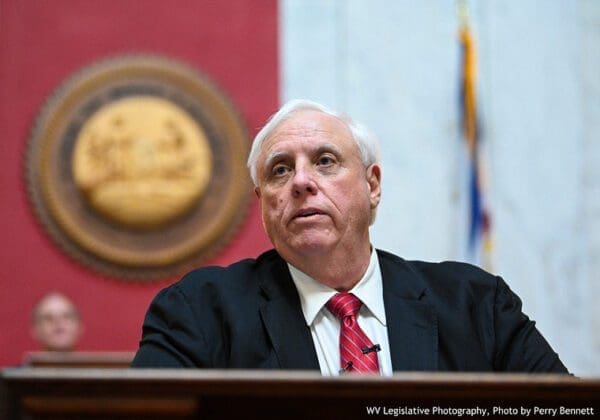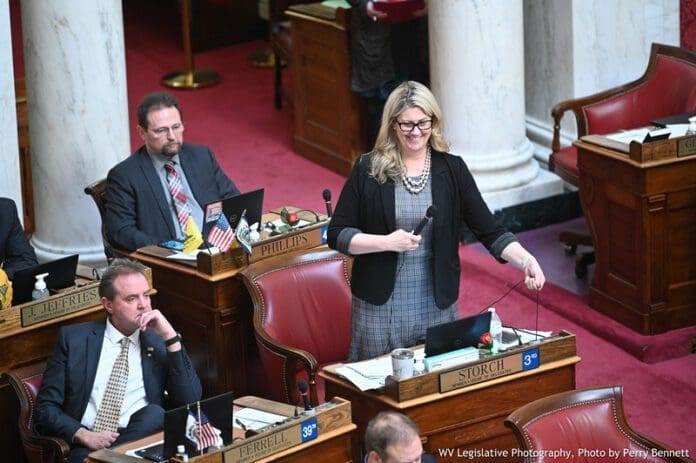Following each election day, whether it’s a mid-term or a general, there is always a surge in the number of floor speeches made in the state House of Delegates.
“That is one thing that drives me a bit batty,” confessed Del. Erikka Storch (R-4th), now serving her sixth term in the House. “New members always want to speak in session every chance they get.”
She does an impressive impression of the newcomers, too.
“‘Well, thank you very much, Mr. Speaker … I’d just to say I’ll be voting for this piece of legislation and I hope my colleagues will do the same.’”
“I mean, there is a big board in front of us and everyone will know how you voted because the board will turn green or red. That’s the way it works,” Storch said with a laugh. “So, that’s something I’ll be sharing with the freshman members because it’s really best they avoid that because it creates resentment and no one wants that.
“I’ll also speak with them about the process and what they can expect,” the lawmaker explained. “There are so many bills. There are around 2,600 that are introduced each session and maybe 300 reach the finish line? They have to understand why it’s like that every year.”

State of the State
Both the House of Delegates and the state Senate gaveled in the 2023 session at noon today, and Gov. Jim Justice will offer his “State of the State Address” this evening beginning at 7 p.m.
The state lawmakers will remain in Charleston for 60 days before the end on March 11. Tax reform, Storch said, will be one primary focus for the Republican Party, and another will be the future of the Department of Health and Human Resources.
The GOP holds wide majorities in both chambers, including a 31-3 margin in the Senate and an 88-12 advantage in the House.
“It sounds like we should have no issues passing the bills we want to pass, but trust me, there will be plenty of public debate because residents feel differently about certain things, and that usually depends on where they live,” Storch said. “West Virginia may be a small state with under 2 million people, but we have five different regions, and our residents believe differently in each of those regions.
“I doubt a lot of people in the Wheeling area realize that,” she said. “But anyone who has traveled the state knows exactly what I’m talking about.”
And that is another reason why, when asked, Storch agreed to mentor the freshman members.
“But I’m not to be partisan in the role because I don’t feel it would make much sense since my goal is to be a conduit for them so they can get the information they’re seeking. That’s the role – help the new members with the information you know they do not know yet,” she explained. “Probably the most important thing for every lawmaker to realize is that there have been butts in those seat for a lot of years, and there will still be butts in those seats long after we’re finished here.
“It went on before us, and it will continue after us, and if a lawmaker does not appreciate that, and you do not recognize that you’re there to represent those people for a dash of time, then you’re missing the point of the whole thing,” Storch said. “And if you don’t realize it, you’re not going to do a good job, and if that’s the caser then I hope those voters don’t send you back again.”

Campaign Promises
Candidates want votes. Voters want action. So, sure, candidates promise action.
To what level is often the issue.
“Usually when someone is running for a seat in the House, they are hearing from people who weren’t happy with the (lawmaker) before them so they come down to Charleston ready to right all of those wrongs,” Storch said. “There‘s absolutely nothing wrong with that either. They just have to go about it the right way.”
So, what Storch plans to explain to the new legislators is how to investigate what they have heard at home once being sworn into serve their respective districts.
“If they’re doing the job the right way, then they are talking with their constituents to see what their concerns are and what their ideas are for whatever issue they believe exists,” Storch said. “But they have to understand that, when they talk with the voters, the voters’ topics are what’s most important to them. It’s the delegate’s decision if they will move on what the voter has explained, and if the delegate does and they have passion for it, then they have to go fight for it. That’s part of the learning curve, too. How to go fight for it the right way.
“If a new member is coming to Charleston for their first session and they are expecting to rewrite all of the laws we are, that new member is going to be disappointed when they go back home after the session. It just doesn’t work like that,” the District 4 delegate added. “That’s not to say that your idea will not be heard because it will be. It’s just knowing how to go about getting the support you’ll need and that is definitely a topic I’ll be covering with our new members.”


